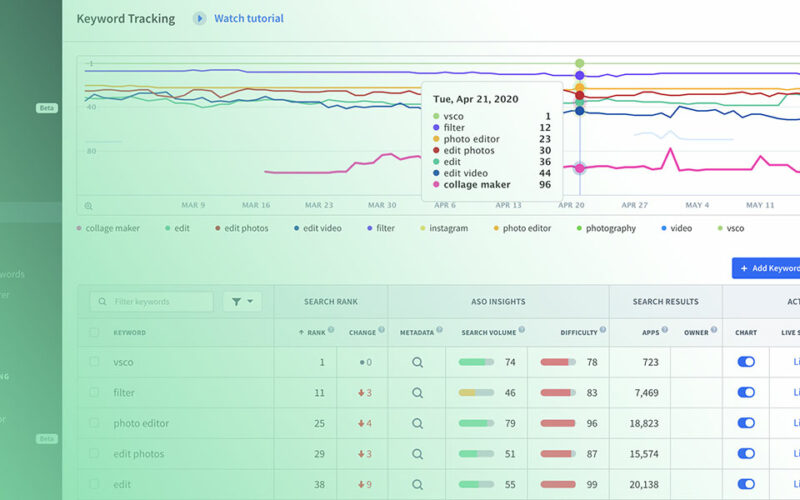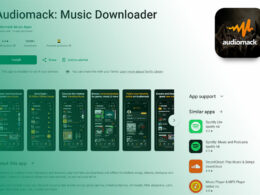Imagine navigating a bustling digital marketplace, each app vying for attention amidst a sea of icons and titles. In this arena, understanding app store keyword search volume isn’t just useful—it’s the compass that guides your app to its destined users.
With myriad applications jostling for the top spots, pinpointing the right keywords can be the difference between obscurity and visibility.
Enter the intricate world of App Store Optimization (ASO), where keyword search volume plays the lead role. Considering the gravity of selecting potent keywords, savvy developers realize this isn’t a task to take lightly.
This isn’t just about data—it’s about crafting an approach that connects. By the end of this dive into ASO strategies, you’ll grasp how to harness the power of app store keyword search volume, ensuring your application resonates with its intended audience.
We’ll unearth tools and tactics such as Mobile User Acquisition and In-App Analytics, offering actionable insights to elevate your app’s discoverability.
So, let’s slice through the noise and lay down a path for your app to thrive, leveraging both the science of mobile app ranking factors and the art of keyword optimization.
Understanding App Store Optimization (ASO)
Definition and Significance
Breakdown of ASO and its components.
App store keyword search volume, right? Kind of the heartbeat of this ASO stuff. So, ASO stands for App Store Optimization – it’s like SEO but for mobile apps in places like the Apple App Store and Google Play.
Think of it as a bunch of actions that give an app its best shot to stand out. It’s not just about getting your app out there; it’s about getting it found, seen, and then downloaded – because what’s the point of an app if no one ever uses it?
It’s not all just about keywords, either. It also dives into the visuals—your app’s icon, screenshots—that’s your app putting its best face forward.
Then, there are ratings and reviews, which can make or break an app. More than just making it look pretty, ASO taps into the technical bits like app metadata, which covers things like your app’s title, description, and updates.
Role of keywords in ASO success.
Keywords are your secret sauce in the ASO recipe. They bridge that gap between what users are slamming into the search bar and your app chillin’ in the store.
The right words can lift an app from the digital depths to the spotlight.
Hence, words matter—a ton. Figure out the right app store keyword search volume, and you’re golden. It’s about relevance, competition, and how often folks are searching for these terms.
Core Components of ASO
Keywords, metadata, reviews, and ratings.
Okay, so we’re circling back to keywords because they’re that crucial. You’re weaving them into your app’s metadata – that’s your title, subtitle, description, and whatnot.
But wait, there’s more. Reviews and ratings aren’t just digital applause; they’re the trust signals telling potential users, “Yeah, this is the good stuff.”
Visual assets and their impact on ASO.
Let’s chat about visual assets. If the app logo is meh or the screenshots look like a throwback to the ’90s, folks swipe left.
Bad visuals are like showing up to a job interview in pajamas—not a good first impression.
High-quality visuals capture attention and can mean the difference between a download or a pass. It’s about that instinctual, eye-candy appeal.
ASO Best Practices
Strategies for maintaining an effective ASO routine.
So, the strategies—keep tabs on your keywords and how they’re performing. Tweak and improve.
It’s not a one-and-done thing; it’s a rinse and repeat. Regularly refresh your visuals, stay engaged with the reviews, and nudge those happy users to rate your app.
Common pitfalls and how to avoid them.
Alright, pitfalls. Not updating your app based on feedback…that’s like ignoring directions when you’re clearly lost.
Then, using irrelevant keywords just because they’ve got high app store search volume is like fishing in the desert—pointless. And don’t even get me started on ignoring your visuals; that’s just leaving money on the table, seriously.
The Role of Keyword Research in ASO

Importance of Keyword Research
Connection between keyword research and app visibility.
So, here’s the thing about keyword research – it’s like the GPS for your app in the store. Hit the right keywords, and boom, you’re on the map, front and center.
Mess it up, and you’re basically invisible, tucked away where no one can find you.
It’s the difference between being in the spotlight or fading into the backdrops of the app universe. Nailing the right app store keyword search volume means users find your app when they’re on the hunt for something new.
Impact on download rates and user engagement.
Now, it’s not just about getting seen. What’s the point if there’s no follow-through?
Keywords are the trigger—when they’re spot on, they don’t just get eyes on your app; they get fingers tapping ‘download’. And beyond that, we’re talking engagement.
The right keywords snag the right users—the ones who’ll dig what your app does and stick around.
They’re the ones who light up the stats with stellar engagement times.
Methods for Conducting Keyword Research
Tools and techniques for effective research.
Alright, diving into research—it’s not all wild guesses and throwing darts in the dark. Tools are your friends here.
We’re talking legit platforms designed to dig up the gold—the keywords users are all about.
They track trends, spy on what’s working for the competition, and toss you the insights you need to make smart calls. It’s a mix of art and science, intuition backed up by cold, hard data.
Analyzing competition and market trends.
And then there’s the competition—never underestimate it.
Cracking open what competitors are up to can reveal gaps you can swoop into or buzzwords that are way overdone.
Combining that with current market trends, it’s like having a forecast that says where the wind’s blowing, which seas are calm, and where to sail your app.
Interpreting Research Data
Understanding search volume metrics and relevance.
Search volume numbers can be dizzying, but they’re nuggets of info that spell out who’s searching for what. The trick is to match volume with relevance.
Too vague, and you’re lost in the noise. Too niche, and maybe no one’s listening. It’s about that sweet spot where interest peaks without tipping into a crowded party where no one hears you.
Evaluating keyword difficulty and ranking potential.
Keyword difficulty—that’s about knowing the climb. Some hills are easy; others are like scaling cliffs with your bare hands.
Picking keywords you can rank for without a Herculean effort is a savvy move.
There’s that strategy game again, always plotting moves, calculating where you can jump to without falling off the board. It’s a dance between ambition and actually standing a chance to make that top spot yours.
Strategies for High and Low Search Volume Keywords
High Search Volume Keywords
Benefits and challenges of targeting high-volume keywords.
Look, going after high search volume keywords is like aiming for the popular clique.
The benefits?
You get tons of eyes on your app, like, heaps. It’s the exposure that can make waves. But here’s the rub—it’s one crowded party, so standing out? That’s tough. It’s like shouting in a concert; sure, you’re heard, but so is everyone else.
Balancing traffic potential with competition.
So it’s all about balance, right? High app store keyword search volume screams opportunity, but it’s also a gladiator arena of competition.
You gotta weigh the traffic you could rake in versus the slugfest to climb rankings. Do you join the fray, or is there a smarter play?
Low Search Volume Keywords
Advantages of targeting niche markets.

Now, flip the script. Low search volume keywords, they’re the hidden alleys, less travelled but cozy. These niches are snug.
Less competition means your voice carries far and wide. For a niche market, it’s like being a big fish in a little pond.
It’s cozy, controlled, and you could be just what that special crowd is searching for.
Techniques for finding and utilizing long-tail keywords.
And then there’s the art of long-tail keywords—those longer, more specific phrases that are super precise. They might not get the masses, but for the few who search them?
Your app pops up like a beacon. Finding them needs a bit of detective work though.
Tools help, sure, but also, think like your user—get in their heads, figure out their lingo, and suddenly, you’re onto something that’s pure gold.
Hybrid Strategies
Combining high and low search volume keywords for balanced visibility.
So maybe, just maybe, we can play both sides. Mix it up with a hybrid strategy—a little bit of the hustle from the high-volume space, and some secret sauce from the low-volume niche.
It’s balance, with some high-reward, high-competition words, sprinkled with unique, easy-win phrases that cut right to the heart of a special few.
Case studies and real-world applications.
Now, take a step back, look out at the wild success stories—apps hitting it big by juggling keywords from both ends of the spectrum.
Each case study, a lesson in striking harmony. They mark a trail to follow, a map that says here’s where mixing it up led to the sweet spot.
That just-right blend of visibility, meeting users exactly where they are with exactly what they need.
Keyword Optimization Across Different Platforms
Apple App Store vs. Google Play Store
Differences in keyword optimization strategies.

Dreaming of shining bright in the app universe? Well, the route you take hinges on whether you play in Apple’s garden or hang with the Android crowd.
Over at the Apple App Store, every word counts; you’ve got a tight space—100 characters—to drop your keyword magic.
It’s like packing for a trip with just a carry-on, every item matters. Google Play, though?
More room to breathe with a 4,000-character limit in your description to sprinkle in your keywords. It’s like having a suitcase you can throw everything into.
Impact of platform-specific factors on keyword selection.
So here’s the thing — Apple and Google, they’ve got their own ways of picking up what you’re putting down.
Apple’s big on the title and subtitle for indexing, while Google also eyeballs the app description. It’s like one friend who only texts and another who’s all about DMs.
And there’s the user behavior, different strokes for different folks.
Global Considerations
Localizing keywords for international markets.
Thinking global? Smart move. But it’s not just about translation— it’s about tuning in to the local vibe. Maybe a phrase is popping in one place but flatlines in another.
So, it’s not enough to just swap out words; you gotta feel the rhythm of how locals speak, search, and play. That means knowing more than language—it’s about getting the cultural scoop, too.
Understanding cultural and linguistic nuances.
And about those nuances—they’re the tiny details that show you get it, like saying “mate” in Australia or dropping a “y’all” in Austin.
It’s about the slang, the local jokes, what’s trending on their streets. That’s how you hitch your keywords to the stars—by speaking their lingo, walking in their digital shoes. It’s delicate, sure, but get it right, and you’re not just an app; you’re the app they’ve been waiting for.
ASO Tools To Use
| ASO Tool | Keyword Tracking | Competitor Analysis | Review & Rating Management | Market Intelligence |
|---|---|---|---|---|
| Sensor Tower | Yes | Yes | Limited | Yes |
| AppFollow | Yes | Yes | Yes | Limited |
| Mobile Action | Yes | Yes | Yes | Yes |
| ASOdesk | Yes | Yes | Yes | Yes |
| App Radar | Yes | Yes | No | Limited |
| AppTweak | Yes | Yes | No | Yes |
| Appfigures | Yes | Limited | Yes | Yes |
| Apptopia | Limited | Yes | No | Yes |
Sensor Tower
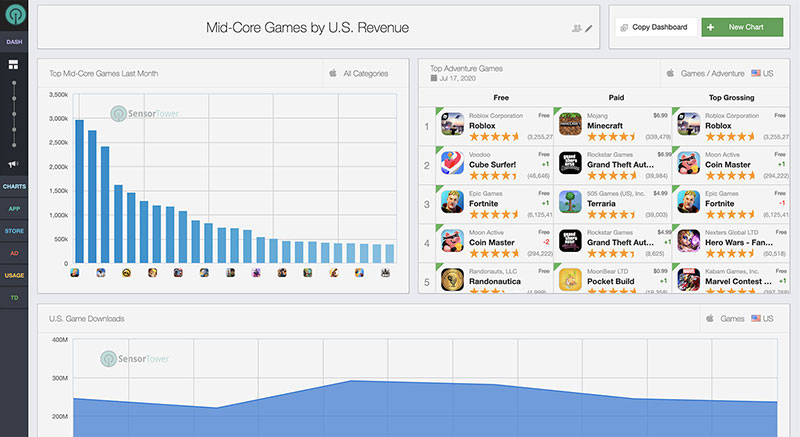
I’ve often marveled at Sensor Tower’s ability to slice through the din of app store data, providing insights that are both deep and actionable. This tool brings together an impressive ensemble of app store analytics, offering a panoramic view of the market landscape. It’s a dynamic instrument in the symphony of App Store Optimization (ASO), capable of harmonizing keyword analysis with competitor tracking.
Best Features:
- Keyword optimization suggestions
- Competitor tracking and insights
- Revenue and download estimations
- Review and rating analysis
What we like about it: The meticulousness of Sensor Tower’s app visibility metrics is top-notch, empowering app developers to fine-tune their strategies with precision.
AppFollow
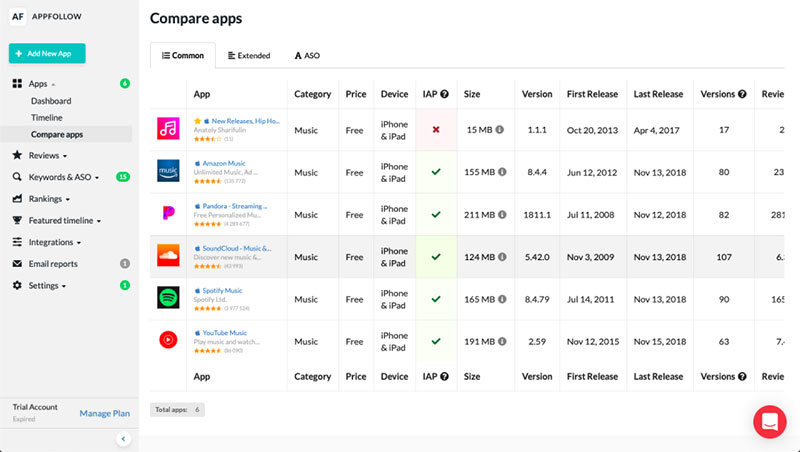
Picture AppFollow as your trusty sidekick in the quest for mastering app store keyword search volume. This tool is a wizard at zipping through user feedback, capturing those invaluable insights that propel app rankings skyward. It’s an ASO companion that’s all about nurturing those crucial user relationships, turning analytics into conversational gold.
Best Features:
- User review and feedback aggregation
- ASO performance tracking
- Integration with help desk platforms
- Localization support
What we like about it: AppFollow’s superpower definitely lies in its ability to amalgamate user feedback, making it a fan favorite for enhancing user engagement metrics.
Mobile Action
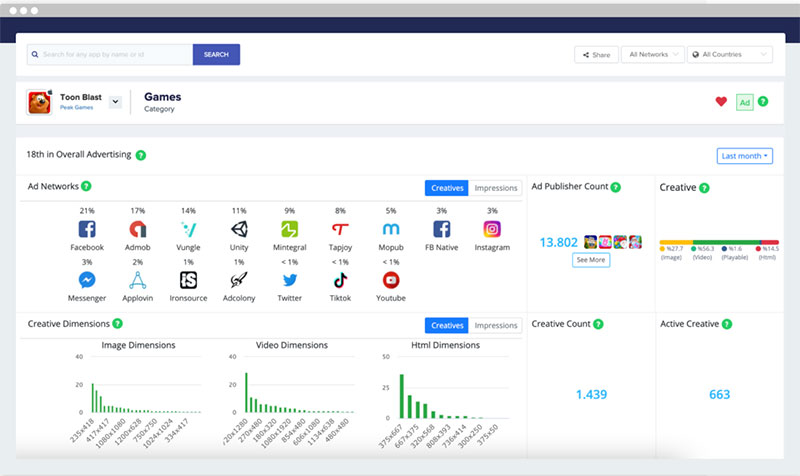
I find Mobile Action’s charm lies in its blend of straightforward usability with a depth of market insights that feel like a cheat code for app marketers. It’s like piloting a recon drone over the mobile app battlefield, pinpointing where to deploy your ASO troops for maximum impact.
Best Features:
- App store intelligence
- Keyword tracking and research
- ASO Score
- Competitor Analysis
What we like about it: It boasts an intuitive ASO score feature, guiding developers to ASO nirvana with remarkable ease and clarity.
ASOdesk
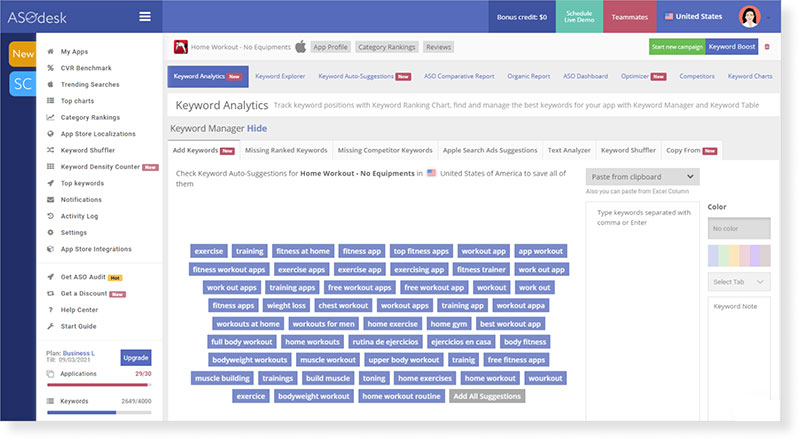
Imagine ASOdesk as the cartographer of the app realm, charting the topography of keyword territories across global app stores. This tool is intuitive yet brimming with features tailored for app marketing strategy refinement, offering deep dives into organic installs statistics and localization opportunities.
Best Features:
- Keyword analytics and management
- Market intelligence and exploration
- Organic user acquisition tracking
- Localization strategy assistance
What we like about it: Its standout feature is undoubtedly the sophisticated keyword analytics, shedding light on the secrets of organic user acquisition.
App Radar
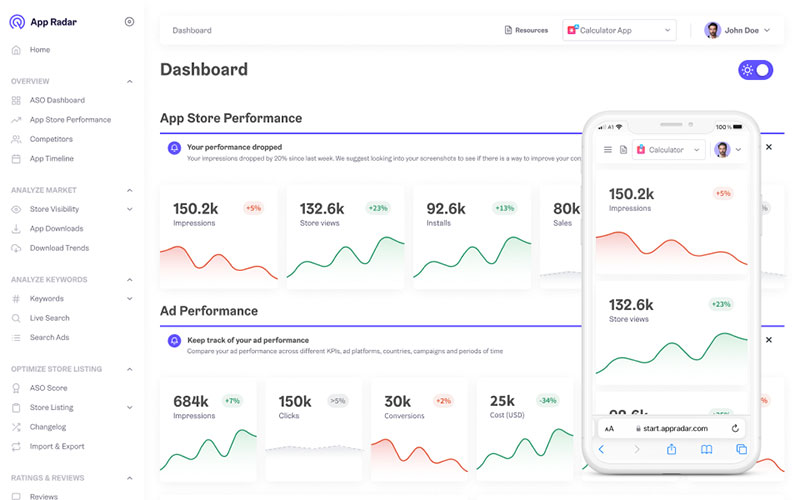
As precise as its name suggests, App Radar zeroes in on the target with military-grade ASO precision. From its extensive keyword ranking artillery to its conversion rate optimization tactics, this ASO command center is decked out to disrupt the status quo of app store searchability.
Best Features:
- Keyword rankings and insights
- Store listing optimization
- ASO and app growth consulting
- Performance monitoring
What we like about it: The store listing optimization offering is particularly impressive, often hailed as the tool’s crowning glory in app discoverability.
AppTweak
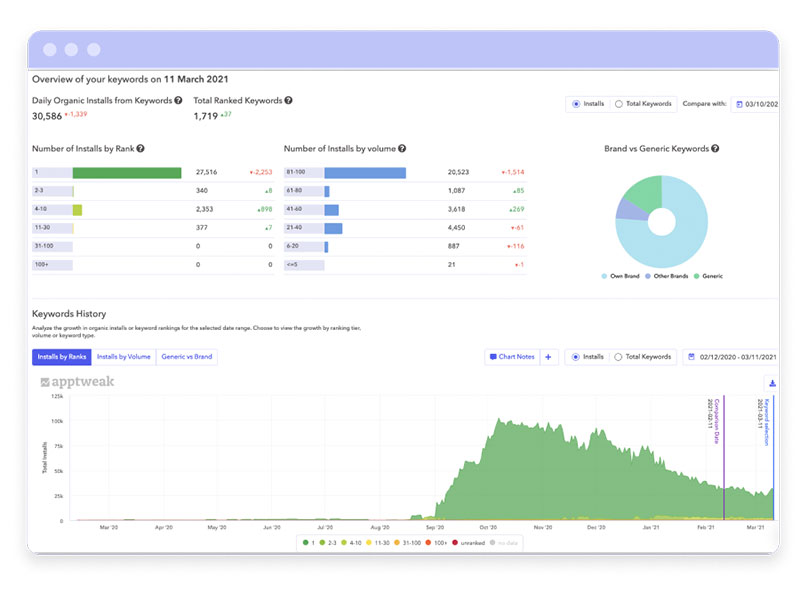
With AppTweak, it’s like harnessing the power of a supercomputer solely focused on surging your app to the zenith of app store charts. This intelligence powerhouse whittles down Search Ads in app stores and keyword trends into an elixir for boosting your mobile app marketing efforts.
Best Features:
- ASO intelligence for keyword optimization
- Search Ads intelligence
- Global reach with multi-language support
- Competitor keyword spy tool
What we like about it: AppTweak’s Search Ads intelligence service stands out, giving users the edge in paid user acquisition channels with undeniably rich insights.
Appfigures
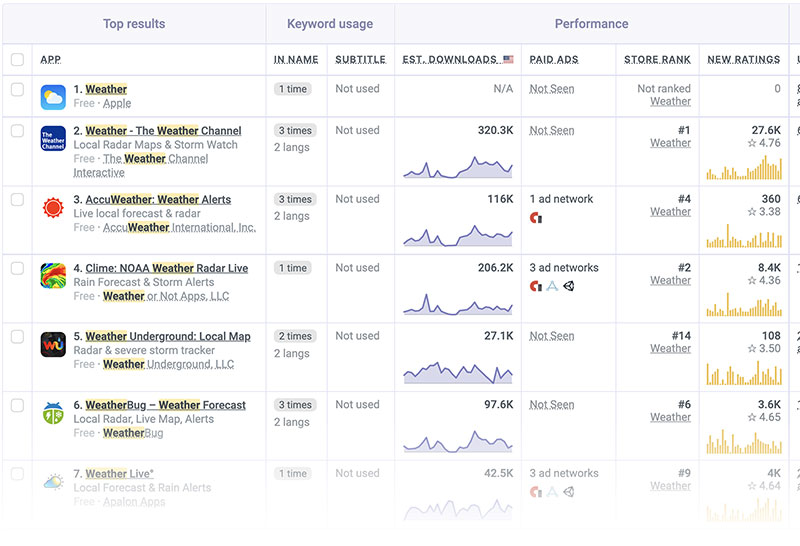
Appfigures could be equated to a seasoned detective, scrutinizing app store clues to crack the code behind keyword search volume and user acquisition tactics. It’s a treasure trove of analysis tools that leaves no stone unturned in the quest for app store glory.
Best Features:
- Sales and download tracking
- App store intelligence and analytics
- Keyword research and discovery
- Review monitoring and analysis
What we like about it: The comprehensive keyword research and discovery tools are a magnet for those obsessed with decoding the enigma of app store keyword search volume.
Apptopia
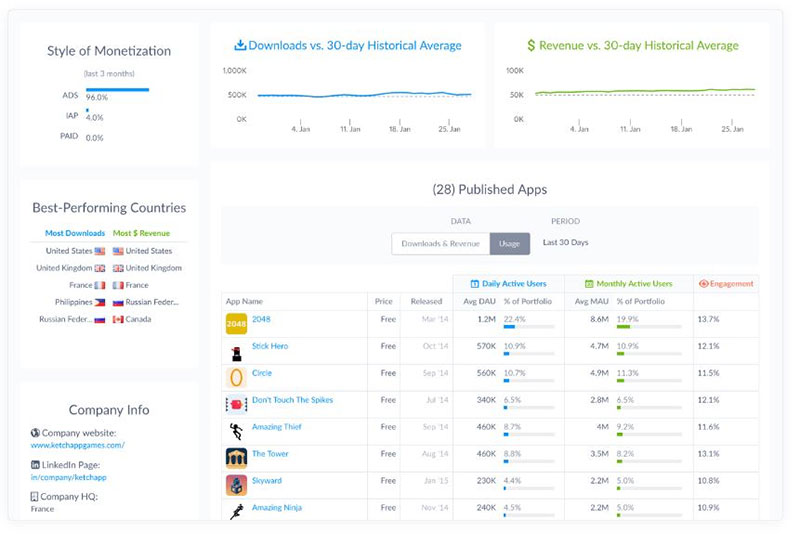
Let’s envision Apptopia as the Silicon Valley unicorn of ASO tools, where every module is designed to streamline the journey towards app store stardom. Seamlessly blending app analytics with business intelligence, it’s the Swiss Army knife for mobile app marketers.
Best Features:
- Performance benchmarks
- Market intelligence and trends analysis
- SDK intelligence
- Acquisition channels insights
What we like about it: The market intelligence and trends analysis is a crowd-pleaser, offering a barometric read on the ever-shifting winds of mobile app advertising.
Risk Management in Keyword Selection
Identifying and Mitigating Risks
Common risks associated with poor keyword selection.
Ever feel like you’re walking on a tightrope, and below you is this big, giant pit of “oops”? Well, that’s what it’s like when keywords aren’t chosen wisely.
Picture this: your app sinks to the murky depths of search results, ’cause you picked those oh-so-popular keywords that everyone and their grandma is using, or even worse, ones that nobody’s searching for.
Squashing these risks means sidestepping the big no-nos. Like, keywords stuffed in with no rhyme or reason—users smell that a mile away and, yep, they’ll be running for the hills.
Strategies for reducing the likelihood of keyword-related issues.
So, how do we dodge these keyword curveballs?
A sprinkle of savvy and a dash of know-how. We’re gauging what’s sizzling and what’s fizzling, avoiding the keyword stuff of legends and tall tales that lead nowhere.
And hey, keeping an eagle eye on those app store keyword search volume trends – it’s like being a weatherman, but for words.
Continuous Monitoring and Adaptation
Importance of ongoing keyword performance tracking.
Ready for the truth bomb? Keywords ain’t a “set and forget” game. It’s more like gardening—cultivate, nurture, repeat. Sticking to one forever and ever?
Nope.
Not if you’re keen on keeping your app in the limelight. ‘Cause what’s hot today might be freezing tomorrow. Enter the hero of our story: tracking.
Being glued to your app’s keyword performance gives you X-ray vision into what’s heating up the charts and what’s cooling off.
Adapting strategies in response to market and algorithm changes.
Then there’s the twist—just when you’ve got the rhythm, the beat drops. Markets do a jig, algorithms shuffle, and what was your keyword groove is now a maze.
Staying nimble is key, swaying with the shifts like you’re grooving to the hottest track. Morphing keywords, teasing new phrases into the mix—that’s the tango of keeping your app toe-tapping its way up the search ranks.
FAQ On App Store Keyword Search Volume
What exactly is app store keyword search volume?
It’s the count of how many times folks are looking up a particular word or phrase in an app store. High volume means it’s trending; fewer searches hint it might be kinda niche.
How does app store keyword search volume affect my app’s visibility?
Like a beacon. Higher volume keywords light up paths to your app for more users. It’s a dance though – balance high volume with relevancy, or risk getting lost in the noise.
Can you explain the difference between high and low search volume keywords?
High search volume keywords are your headliners, they grab lots of attention. Low ones are the hidden tracks, less traffic but they can connect deeply with a specific crew of users.
Which tools can I use to measure app store keyword search volume?
Check out ASO tools like Sensor Tower or App Annie. They’re like spyglasses, giving you a peek into what words are hitting it big.
Is there a way to predict changes in keyword search volume?
You’ve got trends and seasonal shifts – like “fitness apps” booming around New Year’s. Keeping an eye on what’s brewing in culture gives hints about what’s up next.
How often should I revise the keywords for my app?
Picture your app in an ocean; keywords are your sails. Adjust them often as winds change; at least peek at them after app updates, big events, or noticeable shifts in user behavior.
What’s the impact of getting keyword optimization wrong?
Imagine inviting folks to a rock show and a jazz band walks out – mismatched vibes. Wrong keywords can mean zero downloads, or worse, unhappy users who bounce.
Why is localizing keywords important for global app reach?
It’s about speaking everyone’s language, hitting the sweet spot in each locale. Localizing lets you give a friendly nod to users worldwide, saying, “Hey, I get you.”
Should I focus on short-tail or long-tail keywords for my app?
Mix it up. Short-tail grabs broad interest; long-tail catches those with a sharp, specific hunger for what you’re serving. The combo platter approach often works best.
How does Apple App Store’s and Google Play Store’s keyword optimization differ?
Apple’s keen on titles and subheadings, with a smaller keyword field. Google’s eyes roam through your app description, more room to sprinkle in your keyword magic.
Conclusion
Wrapping up, we’ve navigated the twists and turns of app store keyword search volume, unraveling its hefty role in the app world. It’s the neon sign that guides users to your digital doorstep, the silent shout inviting curious clicks.
- Understanding those sought-after terms,
- weaving them into your app’s fabric through savvy ASO tactics,
- keeping pace with ever-changing trends and user behaviors—these are non-negotiables for any app aiming to soar rather than sink.
Lean into the insights from analytics, listen to the story your user reviews are telling, and remember this: the job’s never done. It’s an ongoing tango, an art of constant motion, evolving as swiftly as technology itself. Keywords are your compass in this vast app universe – respect them, learn them, and watch as they paint a path to success. Get this dance right, and app store success isn’t just possible—it’s inevitable.
If you liked this article about app store keyword search volume, you should check out this article about app subtitles.
There are also similar articles discussing mobile apps KPIs, Android app store optimization, app store ranking algorithm, and ASO A/B testing.
And let’s not forget about articles on app keyword research, game ASO, Google Play store ranking algorithm, and Google Play store screenshot sizes.
- TypeScript Today: What is TypeScript Used For? - April 27, 2024
- Professional Video: Cinematography Apps Like FiLMiC Pro - April 26, 2024
- Optimizing Your Shopify Store for Maximum Dropshipping Success - April 26, 2024





